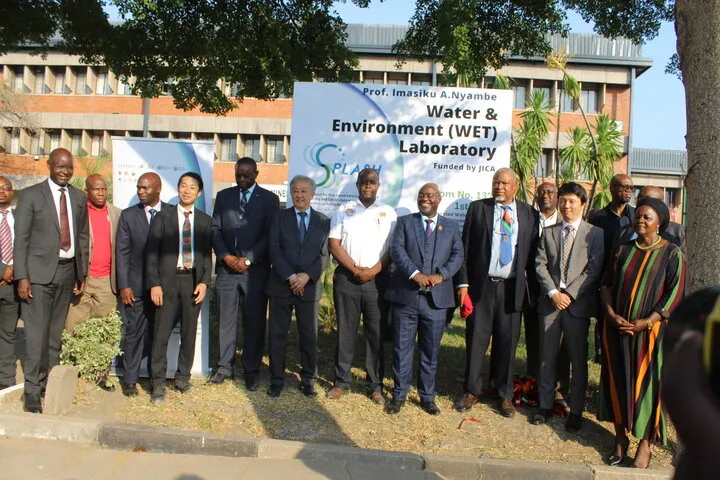
The fight against waterborne diseases and the push for sustainable development in Zambia gained a significant boost on Friday, September 26, 2025, with the official commissioning of the Prof. Imasiku A. Nyambe Water and Environment Laboratory at the University of Zambia (UNZA). The ceremony also marked the official launch of the Integrated Water Resources Management (IWRM) Centre of Excellence.
The facility, an investment of approximately US$443,000 (or US$440,000 and US$500,000 in other sources), was generously funded by the Government of Japan through the Japan International Cooperation Agency (JICA) and the Japan Science and Technology Agency (JST). It is a direct outcome of the SPLASH Project (Risk-based Participatory WASH Planning and Citizen-Data WASH Statistics for African Peri-Urban Settlements).
In a speech read on his behalf by Dr Mukuzo Chongo director of water supply, the Minister of Water Development and Sanitation, Hon. Eng. Collins Nzovu, MP, highlighted the facility's importance in addressing public health challenges.
“This state-of-the-art facility represents a major milestone in our collective efforts to improve water, sanitation, and hygiene (WASH) standards across Zambia, with particular focus on peri-urban communities" he said.
The minister said the facility, equipped with the Absolute Q Digital PCR system, enables "precise detection and quantification of multiple Intestinal germs". He said this breakthrough was "critical in the fight against waterborne diseases such as cholera, which have long posed serious threats to peri-urban settlements".
"I am glad to officially commission this laboratory, I am confident that it will stand as a beacon of scientific excellence and a catalyst for transformative change in Zambia's water and sanitation landscape,” he said.
Speaking on behalf of the Vice-Chancellor, Professor Trywell Kalusopa, Deputy Vice-Chancellor – Research & Innovation, expressed gratitude and emphasised UNZA's commitment to impactful research.
He stated: "We extend our heartfelt gratitude to the Government of Japan for this strong vote of confidence in higher education and investment in advanced technological infrastructure".
He said the laboratory equipped with the state-of-the-art tools, including DNA sequencing equipment, the laboratory is poised to become one of the most advanced in Southern Africa, enabling early-warning assessments for cholera and supporting cutting-edge research across multiple domains.
Echoing the sentiment made by the Vice-chancellor, Japanese Ambassador to Zambia His Excellency Takeuchi Kazuyuki expressed his expectation that the WET Laboratory, equipped with state-of-the-art water quality and environmental analysis facilities in Sub-Saharan Africa, would make a significant contribution to addressing Zambia’s water and sanitation challenges.
He also expressed his hope that the SPLASH Project would further deepen the cooperative relationship between Japan and Zambia and serve as a symbol of friendship between the two countries.
He further said the laboratory will serve as the central hub for the SPLASH project, which has already collected and analysed 571 samples to assess contamination levels and has trained researchers and sponsored PhD candidates.
Meanwhile, Mr. Jotaro Tateyama, Chief Representative of JICA, paid tribute to Professor Imasiku Nyambe for his tireless support and contribution to establishment of the laboratory
"This Laboratory is named in honour of one of Zambia's most distinguished scholars and environmental advocates, Professor Imasiku A. Nyambe, the current Vice-chancellor of the Copperbelt University," he said.
He was Prof Nyambe’s pioneering contributions and unwavering dedication to Water, Sanitation and Environment issues have inspired generations of scientists, policymakers and change makers.
"His collaboration and commitment have been instrumental in advancing our shared values, and we are proud to recognise his legacy through the naming of this laboratory," he said.
The Dean School of Mines Prof Emmanuel Chanda added his assurance to the key partner, JICA that the investment in the Water and Environment Laboratory the Japanese government has made will be safeguarded with utmost commitment.
“We are determined to draw the fullest benefit from this facility, ensuring that it delivers lasting value to research, innovation, and service for the nation and beyond," he said.
And Acting Director Collaborative Research Hub for Multi-Disciplinary Advancement ( (CRHM) Dr Alice Mweetwa said the launching of the Centre and commissioning the lab will "make a meaningful contribution to the achievement of the United Nations Sustainable Development Goals, particularly those on clean water and sanitation, climate action, and sustainable communities.
